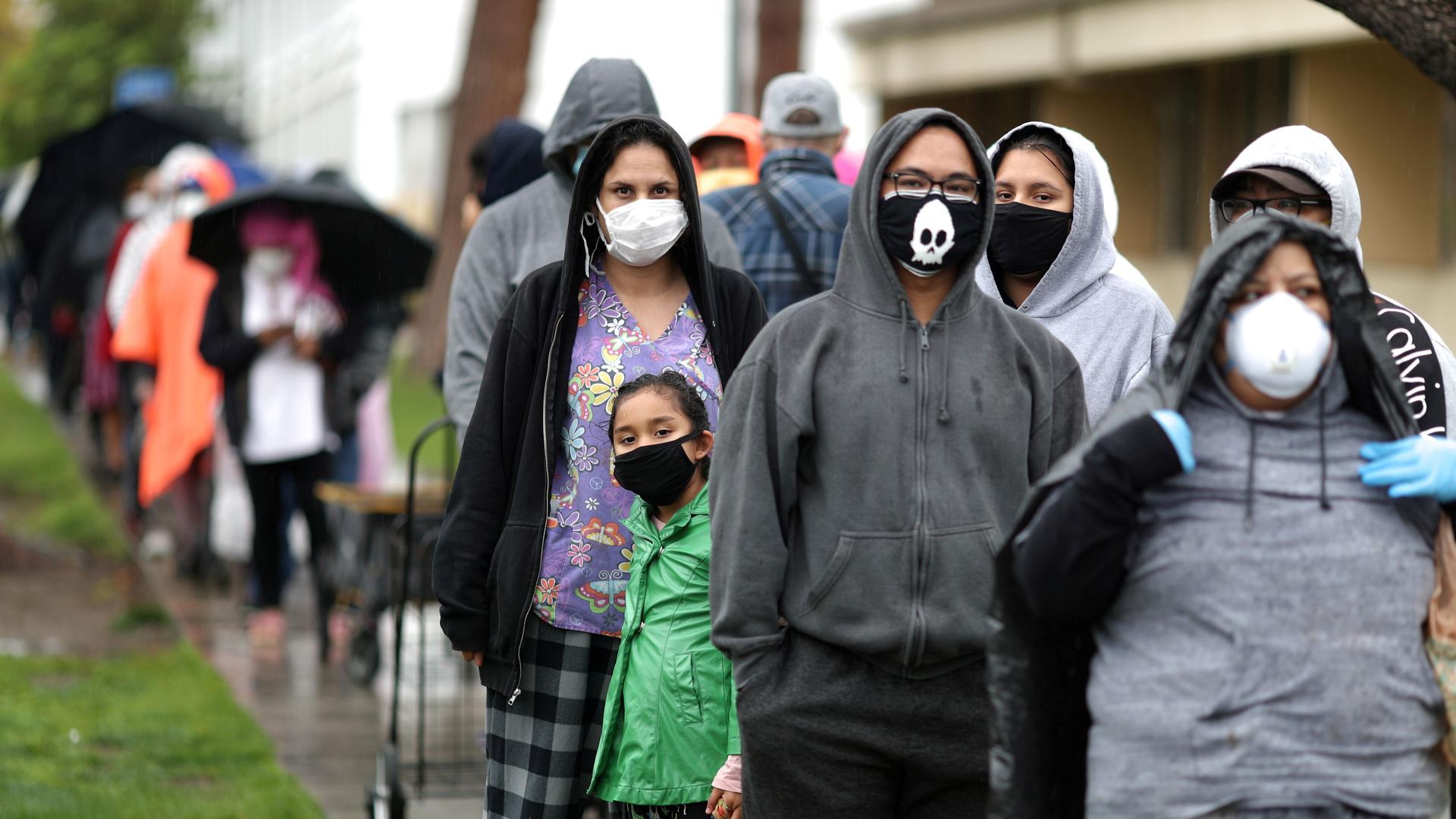These organizers are on another front line of coronavirus: Hunger
Every day in Queens, New York City, the line for food stretches for blocks outside the nonprofit community organization Alianza Ecuatoriana Internacional. Through a bullhorn, founder Walther Sinche directs people to tables stacked with prepackaged food.
“Just looking at their eyes breaks my heart,” he said. “It’s stressful sometimes, but what keeps you moving is that I can help someone have a meal a day.”
“Just looking at their eyes breaks my heart,” he said. “It’s stressful sometimes, but what keeps you moving is that I can help someone have a meal a day.”
Across the US, networks both informal and formal have mobilized to confront a sudden, intense crisis: hunger among millions of immigrants and refugees. Food supply lines have been disrupted, food banks are running low, unemployment is high, and many families are hungry. Activists are helping as fast as they can.
Related: Research on whales, cosmos among many studies derailed by pandemic
Sinche, who’s originally from Ecuador, got sick with COVID-19 in March, as Queens became an epicenter of the disease. Sinche blames overcrowding because the rent is so high.
“That’s how this virus has spread so quick,” he said. “Hundreds of people [died] in our community because of this.”
By the time Sinche recovered, families in his community were going hungry. In early April, Sinche got an email from a woman in Manhattan named Vivian Sorenson, a producer for the Food Network TV show, “Chopped.” She was reaching out to organizations in Queens to ask how she could help.
“And as they started reaching [back] out to me, I started putting them in touch with chefs, and World Central Kitchen,” she said.
Related: Canada closes most of its great outdoors to curb COVID-19
World Central Kitchen is a nonprofit that gets food to starving people in many parts of the world. With their help, Sinche’s organization now feeds more than a thousand people a day. He volunteers regularly to disinfect the distribution area. Many of those who come to get food are undocumented and are still working.
“The delivery guy, the construction worker who’s still building or maintaining the city, they’re also essential workers, and they’re not getting any benefit.”
“The delivery guy, the construction worker who’s still building or maintaining the city, they’re also essential workers, and they’re not getting any benefit,” Sinche said.
Even though they pay taxes, they’re not getting any financial assistance, and they don’t have health care if they get sick. Their families are struggling, and the food Sinche helps provide eases the strain.
“And that’s what motivates me,” he said. “Keeps me alive, pretty much.”
On the opposite side of the country, Roeun Pich feels similarly.
“It’s stressful, but at the end of the day, I feel grateful, thankful, you know, like I did some good,” he said.
Related: Coronavirus upended her family. But this Latina teen is determined to make her vote count.
Pich is a Khmer refugee who fled genocide in Cambodia as a child. He was nearly deported by the Trump administration last year because of a 20-year-old felony. After activism by the Center for Empowering Refugees and Immigrants, or CERI, in Oakland, California, officials expunged Pich’s record, allowing him to stay in the country.
Now, Pich grocery shops for CERI and helps deliver supplies to Khmer refugee elders and some of their children and grandchildren. The job allows Pich to help support his five kids, and show his gratitude to his community.
“They supported me a lot and through thick and thin, like [with] rallies; [they also] wrote letters. They care for me, they’ve been there for me; now, it’s my turn to show we’ve got each other’s backs, you know.”
“They supported me a lot and through thick and thin, like [with] rallies; [they also] wrote letters,” Pich said. “They care for me, they’ve been there for me; now, it’s my turn to show we’ve got each other’s backs, you know.”
It took a lot of thinking to work out the logistics of becoming a food distribution operation, said CERI coordinator Kate Wadsworth.
Related: Nicholas Burns: US’ ‘unusual’ absence from world stage is bad for Americans
“We’re all searching, scrambling to figure out what are the needs? How are we going to do this? How will we connect with people and support?” she said. “And basically, we really quickly realized that the biggest issue is going to be food.”
In Dallas, the best solution the International Rescue Committee found to feed 60 refugee families was a stand at a busy intersection near the neighborhood where they live. IRC coordinator Isabella Chamberlain wears a mask and gloves as she hands out food and supplies. She said the newest refugees from Sudan, Afghanistan and Myanmar are among those who need the most help.
“That population is really struggling. It’s often because their first jobs are hourly workers, and their hours immediately get cut or they get laid off, and they don’t qualify for unemployment benefits right now because they haven’t been here long enough.”
“That population is really struggling. It’s often because their first jobs are hourly workers, and their hours immediately get cut or they get laid off, and they don’t qualify for unemployment benefits right now because they haven’t been here long enough.”
People drop off donations, and Chamberlain goes to farms and greenhouses to pick up produce. She and other volunteers disinfect every item before sorting the supplies into bags. She said setting up the whole system so quickly was daunting.
“But it’s all about action right now. I think the time to really sort through our feelings will probably come later because, you know, there’s just people in need and there’s no time to be overwhelmed.”
If she and others across the country hadn’t acted fast, Chamberlain said, people would have starved. And if they don’t keep it up, people still might go hungry.
